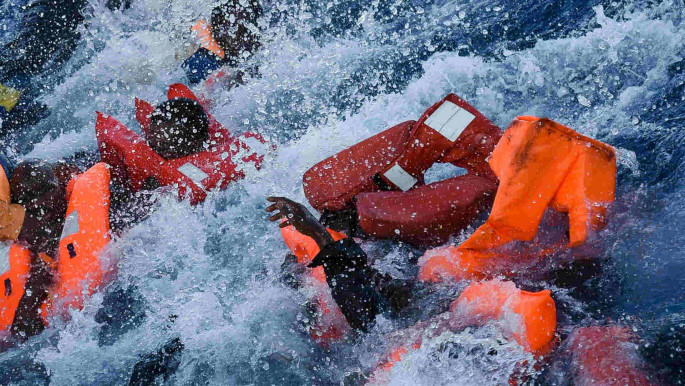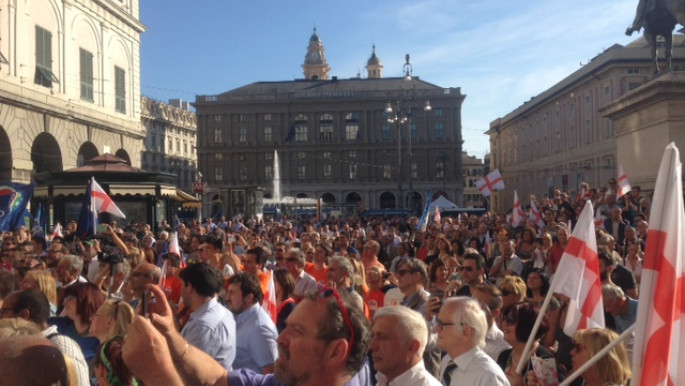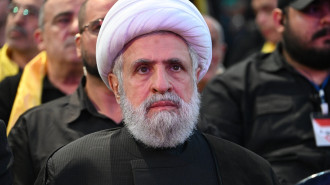Blaming the rescuers: EU policy lets refugees drown
FRONTEX, the EU's border control agency, concocted a "toxic narrative" by blaming NGOs for the rise in refugee numbers and deaths at sea, a new report has revealed.
The agency had claimed groups conducting search-and-rescue operations in the Mediterranean had "colluded with people-smugglers".
But in doing so, it had ignored "much more important processes and actors - including the regional political and economic contexts in Africa, EU policies and operations at sea, the intervention of the Libyan Coast Guard and the organisation of smuggling in Libya", stated the report, titled Blaming the Rescuers.
The detailed report, from the University of London's Forensic Oceanography department at Goldsmiths, systematically deconstructs the claims being spread by EU and Italian leaders as well as others.
Leaving little room for debate, Blaming the Rescuers breaks down each of the arguments made by FRONTEX, and absolving NGOs of wrongdoing.
"Accusations have been founded on biased analysis which has deliberately singled out SAR [search-and-rescue] NGOs from the broader web of interactions that together shape the dynamics and conditions of maritime crossings. SAR NGOs were not the cause of increased crossings and shifting smugglers' tactics, but were rather a fundamental civilian response to a dire situation that was not of their making."
 |
Rome has already made questionable arrangements and deals with Libya's border patrol militias and coastguard, while public focus in Italy was set on the NGOs' alleged collusion with traffickers |  |
Researchers Charles Heller and Lorenzo Pezzani have worked together since 2011 to "critically investigate" abuses against refugees and the militarisation of the Mediterranean Sea.
Their Blaming the Rescuers report should put to rest much of the debate that has been raging for weeks in the EU over NGOs operating in the Mediterranean.
 |
|
| The Mediterranean has become a watery grave for thousands of refugees in recent years [Getty] |
But for international human rights organisations working at sea, as well as Italian-based refugee rights and anti-fascist organisers, the damage of the allegations has already been done.
Rome has already made questionable arrangements and deals with Libya's border patrol militias and coastguard, while public focus in Italy was set on the NGOs' alleged collusion with traffickers. The Libyan coastguard has meanwhile been caught on camera abusing refugees and shooting live rounds in the direction of NGO ships and refugee boats.
In-depth: Europe's fortress condemns refugees to Libyan danger
EU leaders and Italian politicians have also been successful in using the false allegations to shore up electoral support among a growing swell of far-right and anti-migrant sentiment across Europe.
In Italy, politicians from left to the far-right have exploited the situation to enact stricter anti-refugee laws, building more refugee detention centres and to win votes in local municipal elections.
All this comes as white supremacist extremist groups across the globe used the FRONTEX allegations to promote and plan anti-refugee maritime actions based on the idea of a "refugee invasion" of Europe - claiming hordes of dangerous, rapist, dark-skinned men were threatening Europe's way of life.
Fortess Europe enters Africa
While European officials and media have spent much of 2017 so far debating the false claims against NGOs, while humanitarian aid workers were paraded in front of the Italian parliament for questioning, at least 1,808 people died trying to cross the Mediterranean Sea, according to the IOM's "Missing Migrants" project.
| Watch the Libyan coastguard intercept an NGO ship carrying out search-and-rescue operations |
Italy's government, backed by the EU, has meanwhile signed a series of deals - not only with Libya, but also Chad and Niger - and is drawing up several more deals with African nations to stop the flow of refugees from reaching the Libyan borders.
The deal made between Italy and Libya has been broadly criticised by human rights groups after evidence emerged of abuse, torture, rape, murder and even open-air Libyan-operated slave markets, according to the IOM.
Despite reports of widespread abuses in Libya, Italy and the EU have taken a policy of containment and deportation of refugees to Libya - which many activists and human rights groups are calling "a death sentence".
Adding to the clear moral and ethical problems with deporting refugees to Libya is that the process of border closures will never work, and has always resulted in another route opening up as an alternative.
"People can't be stopped with these types of containment campaigns," said Aurelie Ponthieu of Doctors Without Borders. "How many times have we seen people just shift? More often than not its a shift to more dangerous routes."
In-depth: Refugees still braving the soul-crushing 'Balkans route'
According to the latest report released by the EU Commission itself, the Fourth Progress Report on the Partnership Framework with third countries under the European Agenda on Migration, while EU containment efforts thus far show a slight reduction drop in the numbers of refugees moving through known routes, this is more likely due to refugees and smugglers using alternatives.
"New routes are more difficult to use and riskier, leading to higher prices demanded by the smugglers for transport, and higher risks for the migrants," reads the report.
The Italy-Libya deal says conditions of current "holding facilities" must reach international human rights standards, while also stating that more centres will be built. With a rising number of Nigerians making their way to Italy through Libya due to violence and now famine, the EU's containment policy is likely to be a massive failure and an obvious humanitarian crisis.
Far-left Genoa moves right
Hundreds of protesters gathered last month at Genoa's main Piazza De Ferrari square to hear from a "who's-who" of right-wing and far-right candidates campaigning in local elections.
The two main attractions were Matteo Salvini, head of the far-right Lega Nord (Northern League), and Giorgia Meloni, the co-founder of Fratelli d'Italia (Brothers of Italy). Meloni stood before the crowd and aggressively proclaimed: "We have to keep our culture alive! We can't become the only nation in the world to pay for it's own invasion!"
 |
Five years ago, it would have been impossible for them to be here out in the open like this |  |
The "invasion" to which Meloni referred is the ultra-right-wing theory being spread by neo-Nazis and neo-fascists around the globe to stir up anti-migrant racism and support for far-right political parties.
"Five years ago this gathering would not have been possible," said one of the podium speakers at the "coalition of the right" rally.
 |
|
| Huge crowds turned out for a far-right rally in Genoa, a traditional bastion of leftist activism [Teresa Vinni] |
Local leftists watching in Genoa, a historically "red city" that used to take pride in being the backbone of anti-fascist resistance in Italy, agree.
"Five years ago, it would have been impossible for them to be here out in the open like this," said Amalia, a 38-year-old feminist who organises around issues of refugees in the city.
"Giorgia Meloni is alleged to have began her political career as an open fascist. She's cleaned herself up over the years, but her rhetoric is the same as before - 'there's an invasion of wild refugees stealing all the Italian jobs,' she says."
Election results in Genoa do not indicate any clear party majority, but show that the centre-right coalition has a lead, and will head into run-off elections against the centre-left coalition.
"The fact that the right wing could win was becoming somewhat predictable in Genoa, we've seen a lot of the traditionally working class left shift to the right with the decline in union labour power, but a coalition led by Bucci of Lega Nord is not just the right - this is the far-right and they want to open the door to fascism."
As reported previously by the New Arab, the allegations produced by FRONTEX had been used by white supremacists across the globe to push the myth of a Muslim refugee "invasion".
Anti-migrant confrontation at sea
Extreme right-wing activists including Martin Sellner of Generation Identitaire and "alt-right celebrity" Lauren Southern - along with a transatlantic group of white supremacists - were arrested in Catania, Sicily, after lighting flares and attempting to stop a massive search-and-rescue vessel with their small passenger boat.
The group was released a short time later.
The stunt won praise from neo-Nazis around the globe, who have organised an online fundraiser to collect 50,000 euros to "defend Europe from invasion" - by paying for the costs of a "larger ship or ships", more people and more equipment to stop NGO ships in the Mediterranean.
They have called on others to join their battle as "reconquistadors".
In-depth: Europe's border regime leaves the Mediterranean a (profitable) graveyard
In several phone conversations with the Italian coastguard, The New Arab was able to confirm that four people - including Matt Sellner and Lauren Southern - were charged with two crimes, obstructing a moving boat and creating a "false alarm" with the non-emergency use of flares.
It is not clear if the charges are still being pursued by Italian courts.
How this group of right-wing extremists was able to travel to Italy and break the law by endangering a search-and-rescue mission - and then openly fundraise more than 50,000 euros to again attempt to block more SAR missions from taking place is still a mystery.
In all conversations with Italian authorities for the production of this report, the potential for some type of far-right action at sea was either minimised or dismissed. The Italian coastguard gave no indication of any pre-emptive measures that would be taken.
Aurelie Ponthieu of Doctors Without Borders said the "toxic narrative" could yet have more potentially dangerous consequences.
"For those working for NGOs to be stopped - what they're calling for, by stopping search-and-rescue operations, is for people to die," she said. "The only alternative to NGOs like us filling in the gaps where states are failing, the only alternative, is to let more people die - and that has been the EU's policy."
Mohammed Harun Arsalai is an independent journalist and political activist from the Bay Area of California, and co-founder of the independent media project, Documenting Afghanistan. Currently based in his native Afghanistan, Mohammed's recent work focuses on refugees, the War on Terror, and militant groups operating inside Afghanistan. Follow him on Twitter: @ArsalaiH
Teresa Vinni is an independent journalist and photographer based in Genoa
Follow us on Twitter: @the_newarab





 Follow the Middle East's top stories in English at The New Arab on Google News
Follow the Middle East's top stories in English at The New Arab on Google News


